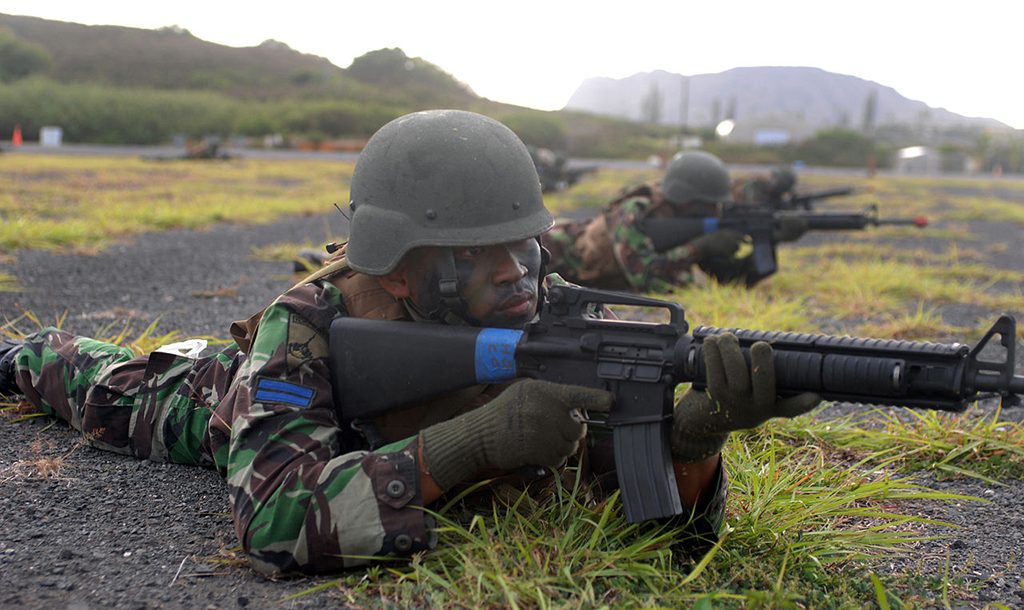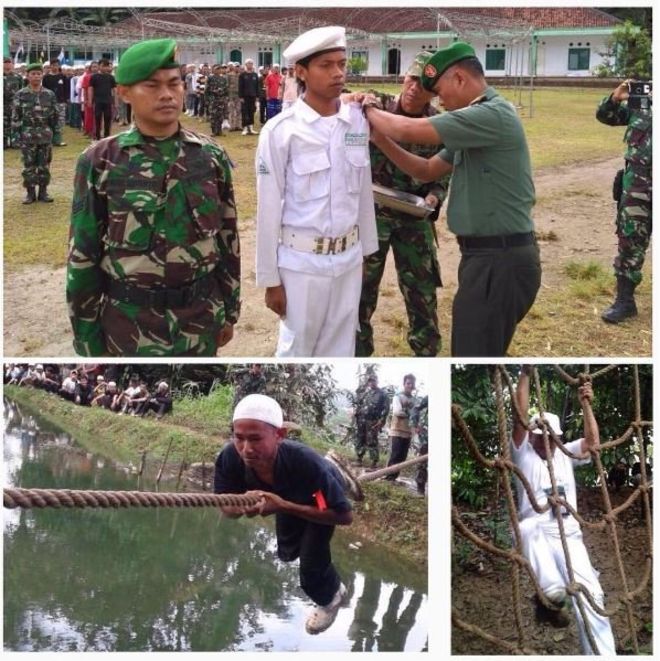By calling upon citizens’ supposed rights and obligations to defend the nation, Indonesia’s military is marching down a perilous path, writes Bhatara Ibnu Reza.
In early January, the Indonesian public was shocked to discover that the military had been training the notorious Islamic Defenders’ Front (Fron Pembela Islam or FPI) in Lebak, Banten.
According to news reports, the military trained the vigilante group, who played a major role in Jakarta’s recent anti-Ahok protests, as part of its Bela Negara (State Defence) Program, codified by Indonesia’s 2015 Defence White Paper.
The news was first broadcast via FPI’s Instagram account with pictures of the training going viral across cyberspace, including exercises with the army (TNI) in Madura.
Faced with such controversy and a wave of criticism from civil society, the Siliwangi Military Command removed the Lebak district regional commander for violating procedure.
But the incident is yet another controversy in a long list of troubles that has plagued Bela Negara since its inception. More significantly, this latest misstep is based on a flawed ideology that brings the Indonesian military and citizens too close together for comfort.
Bela Negara aims to recruit civilians to defend the state by providing basic military training, including weapon use, and the reinforcement of state ideology among ordinary citizens. The program also has a militaristic style, and no particular law has been made to legitimise the program.
According to Indonesia’s 2015 Defence White Paper, in 10 years the program will recruit 100 million militant cadres across the archipelago. But these ‘militant cadres’ are not recognised under any defence law, and it is not clear whether they are combatants or civilians.
The only legal basis for the program is Article 27(3) and Article 30(1) of the Constitution; these highlights both the right and duty of citizens to defend the state under the Total People’s Defence and Security System.
Originally, Total People’s Defence was Indonesia’s experience of guerilla warfare during the war of independence. Two key elements characterise it. First, the potential for all citizens to fight the ‘enemy’, and second, the blurred distinction between the military and the people during an armed resistance.
Legally, the ideology breaches the laws of war since the implementation of Total People’s Defence does not clearly distinguish between civilians and combatants, which is the basic international rule protecting civilians in armed conflicts. The distinction principle imposes obligations on conflicting parties to differentiate between combatants and civilians. In addition, combatants only have the right to attack legitimate military targets, and civilians are immune from targeting unless they take a direct part in hostilities.
The intention to obscure the distinction was not without purpose – this being to ensure the military remains influential in the social and political life of Indonesia. The ideology also mirrors the Army’s self-declared sense of unity with the people (kemanunggalan TNI dan rakyat).
The Army adopts this position by defining themselves as being one with the people and identifying their interests as the people’s interests. The stance also allows the military to undermine the civilian government if the government is seen not to act in the people’s interests, and defend their interest in politics.
The Army also uses the ideology of Total People’s Defence to act independently and empower their territorial commands to form so-called civilian people’s resistance, also known as militias. These are created as a pretext under citizens’ right to defend the state.
These militia groups have been recruited, trained and supported by the state armed forces to do ‘the dirty work’ of the military against separatist elements and society’s undesirables, mostly in conflict areas like East Timor and Aceh. Its most recent incarnation is seen in the district military command ‘tacitly’ providing training to FPI under Bela Negara.
As such, Bela Negara is simply another way for the military to engage in national politics through the militarisation of the civilian population under their supposed rights and obligations when it comes to defending the nation.
This activity is reinforced by the use of terms like proxy war against foreign intervention, and extreme ideologies and external influences like communism and homosexuality. By choosing to engage with and confront such issues, it is easy for the military to find allies with vigilante groups like FPI. Furthermore, these groups can easily transform themselves into Bela Negara groups and become the military’s proxy.
Most worryingly, though, with its illegal use of a dangerous ideology, Bela Negara is cultivating a culture of violence and breaching the law of armed conflict.
Bhatara Ibnu Reza is a PhD candidate in the Faculty of Law at the University of New South Wales, where he is researching civilian involvement in state defence. He is also as a senior researcher for Imparsial, the Indonesian Human Rights Monitor.
 Facebook
Facebook  Twitter
Twitter  Soundcloud
Soundcloud  Youtube
Youtube  Rss
Rss 
